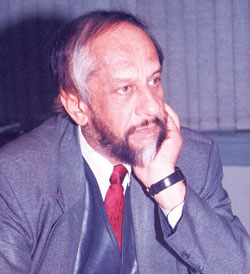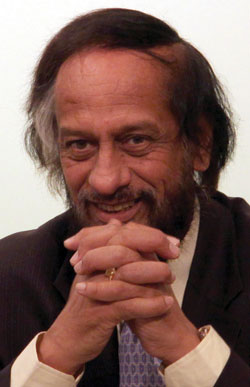
| Dr Rajendra Kumar Pachauri has earned global acclaim due to the active role that he has played in several international forums dealing with the subject of climate change and its policy dimensions. He has served as the chairperson of the Intergovernmental Panel on Climate Change (IPCC) since 2002. Under his tenure, the IPCC was awarded the Nobel Peace Prize in 2007 |
 “With the great deal of effort and fair amount of additional investment, we created this green campus,” says Dr Rajendra Kumar Pachauri, Chancellor, TERI University, in an in depth conversation with Sheena Joseph Cherian, ENN
“With the great deal of effort and fair amount of additional investment, we created this green campus,” says Dr Rajendra Kumar Pachauri, Chancellor, TERI University, in an in depth conversation with Sheena Joseph Cherian, ENN
Tell us about TERI University.
TERI started as a research institute, but it turned into an academic institution because I realised that our research could gain a new impetus when we had young people around to motivate us. The students too can gain a lot by being proximate to the kind of researchers who are at the institute. So we decided to set up an Institute of Higher Learning which came into existence in the year 1999 when we received UGC recognition. The TERI University campus was inaugurated in the year 2008.
What are your views on the regulatory regime that we have in education sector? In your opinion we need to make education more autonomous or is there need for more regulation?
What we need is a system of transparent accreditation. Basically we need to have in place a bureaucratic body that is run by persons of distinction. So that’s what we really require and if we can ensure that, I think you will have a far more effective system of regulation than what we have currently. These days we require a large number of higher education institutes in this country. If people who are going to create these new institutes have to face lot of bureaucratic problems, they might be forced to back out, and that will not serve the interests of higher education in the country. So either we should reform the UGC itself or replace it with something else that is far more dynamic and far less bureaucratic.
Tell us about your Green Campus.
With the great deal of effort and fair amount of additional investment, we created this green campus. This is a very difficult site to construct on, because this is a rocky area. However, we went ahead and did it; we did it because we felt that we have to practice what we preach. Over a period of time our green campus will save us lot of money, as we use much less energy, much less water. Merely by working in this campus and getting their education here, the young people are imbibing knowledge and experience that they otherwise could not get from the text books.
When it comes to foreign collaborations, what is the vision of TERI University?
Mahatma Gandhi has rightly said that while he would like to keep the windows of his home open, he would not want the winds from outside to sweep him and others from their own dwellings. I think it is critically important in this age that we link up with the institutions everywhere in the world. This is because knowledge is universal. Knowledge has to be seen as a resource that is accessible to everyone. TERI University has relationship with the Yale University, with the University of Eastern Finland, with the Open University in UK, with University in Australia, with the Free University in Berlin, and few other universities in the world. We have also entered into the MOU with the National University of Mongolia. TERI university right from its inception has emphasised on the relationship building aspect of knowledge creation. Therefore we work very closely with the Universities across the globe.
Does TERI University have online programme for students?
We do have online programs, but we have to do a lot more in this area. We are also hoping to set up TERI University centres in the other parts of the country. We have requested permission from the authorities concerned to set up the centres. Once we are able to expand, these online long distance programmes will take off in a big way. Faculty over here in Delhi will be able to provide learning through electronic means to centres of the TERI University in other parts of the country.
What are you views on the industry-academia collaborations?
I think the Industry-Academia partnership is absolutely crucial for giving students an overview of the kind of issues that they will be dealing with in future. At TERI, all our students get internships in several organisations, including some in TERI itself. This gives students exposure to whole range of problems and situations that they will otherwise never encounter, if they were just doing the classroom based programme of instructions. So we greatly emphasise this relationship and may I say that the TERI itself gets a large number of projects, which we are essentially doing in partnerships with industry.
 “Over a period of time our green campus will save us lot of money, as we use much less energy, much less water. Merely by working in this campus and getting their education here, the young people are imbibing knowledge”
“Over a period of time our green campus will save us lot of money, as we use much less energy, much less water. Merely by working in this campus and getting their education here, the young people are imbibing knowledge”
What is view on ICT in education?
ICT poses as a cornucopia of opportunities by which you can not only create information far more efficiently; you can also access knowledge that has been created by anyone else in a different part of the world. It is imperative to have ICT at the core of the pedagogical methods that we use for teaching and training out students.
What initiatives would you like the government to undertake in the education sector?
I would like to refer to what the Prime Minister has been emphasising. He has said that Science and Technology is the area where he is going to provide much more funding. He has also highlighted the importance of sustainable development in a society like ours. Now to make both these things happen, firstly you need much more research for sustainable development and this will go into the study of policies, of analysis of different types of development models, both at the national level and the sub-national levels. This will also require that we provide enough funding for Science and Technology research in universities in particular. The government should also think about creating an institution on the lines of National Science Foundation in the US which functions in a very transparent and open manner.
Highlight the projects of the TERI University.
TERI has more than 200 Projects at any point of time. These projects range from very sophisticated research in the field of bio-technology, to those that have to do with policy analysis. Many are focussed on the subjects of sustainable growth and managing the environment. We have a lot of activity in the forest area. TERI has a multitude of research going on in the area of climate change. We have a Super Computer in TERI which allows us to run sophisticated global models on climate change by which we are able to study the impacts of climate change in different parts of India.






















